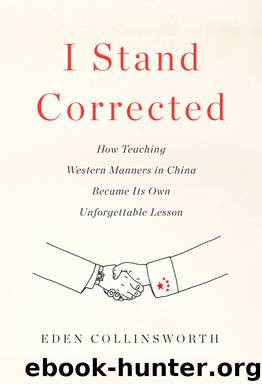I Stand Corrected by Eden Collinsworth

Author:Eden Collinsworth [Collinsworth, Eden]
Language: eng
Format: epub
ISBN: 978-0-385-53870-1
Publisher: Knopf Doubleday Publishing Group
Published: 2014-10-06T16:00:00+00:00
CHAPTER EIGHTEEN
China’s government now protects siheyuans from being destroyed. But that doesn’t mean they can’t be moved, and I have met an extremely rich man who did precisely that. He paid a fortune to relocate several families living in a Beijing siheyuan and then spent another fortune moving the entire siheyuan—stone by ancient stone—to the roof of a five-star hotel. I speak here of a siheyuan built in the Ming dynasty and reincarnated as the penthouse of a luxury hotel so that its owner might enjoy room service.
Before the ebb tides of China’s middle class began lapping onto the shores of communism, it was believed that love was built on a foundation of common political understanding and comradeship in work. Money was not a consideration in marriage because money was not the foundation of love.
No longer.
Today, a man in China who does not own a house is not considered very good marriage material, and pressures caused by the mainstream societal expectation of marriage and progeny have resulted in financial Darwinism among the army of young Chinese men coming of age.
The ostentatious display of home ownership in China is made more remarkable by the fact that most of the ground on which the Chinese stand—along with the buildings, residential and business alike—is government owned and leased for a curtailed period of fifty years.
China’s government has claimed its legitimacy from the past ten years of growth, and grow the nation it must continue to do. The Communist Party’s sweeping modernization plan is to move nine hundred million people—about 70 percent of the country’s population—into newly constructed cities by 2025. This top-down mandate is meant to transform China’s export-based economy into one whose growth is based on domestic demand for products, but acute problems with farmland rights and housing have deepened the class divide and bred public discontent.
The government hopes that by providing consumer credit it will propel consumer spending, which will result in a different kind of economic growth. But there are financial hazards to China’s loosely regulated cash-borrowing options, and with no unified official procedure, registration of land-use rights falls under the jurisdiction of local authorities whose self-serving interpretation often invites corruption. Land can be expropriated for reasons of “public interest,” the definition of which has been deliberately kept vague, which—deliberate or not—enables government officials and developers to dispossess farmers and pay them below-market prices for their land.
As a result of this rushed urbanization program, China’s land-leasing winners are the developers who can flash enough money at real estate opportunities to make short-term sense. What is left in the wake of the country’s binge growth is an eerily repetitive landscape seen even in the poorest parts of China, where luxury towers and monolithic office buildings stand empty and motorways end suddenly in a patch of gravel.
The theory behind China’s urbanization—whereby newly created city dwellers will, of their own accord, create new business and break the cycle of those farming the land consuming only what they grow—has proved uneven in its implementation.
Download
This site does not store any files on its server. We only index and link to content provided by other sites. Please contact the content providers to delete copyright contents if any and email us, we'll remove relevant links or contents immediately.
Becoming by Michelle Obama(10026)
Beartown by Fredrik Backman(5754)
The Last Black Unicorn by Tiffany Haddish(5635)
Man's Search for Meaning by Viktor Frankl(4605)
The Book of Joy by Dalai Lama(3986)
The Five People You Meet in Heaven by Mitch Albom(3567)
In a Sunburned Country by Bill Bryson(3542)
The Choice by Edith Eva Eger(3469)
Full Circle by Michael Palin(3449)
The Mamba Mentality by Kobe Bryant(3276)
The Social Psychology of Inequality by Unknown(3029)
Imagine Me by Tahereh Mafi(2959)
Book of Life by Deborah Harkness(2938)
The Checklist Manifesto by Atul Gawande(2852)
Less by Andrew Sean Greer(2694)
A Burst of Light by Audre Lorde(2607)
The Big Twitch by Sean Dooley(2436)
No Room for Small Dreams by Shimon Peres(2368)
Everest the Cruel Way by Joe Tasker(2342)
